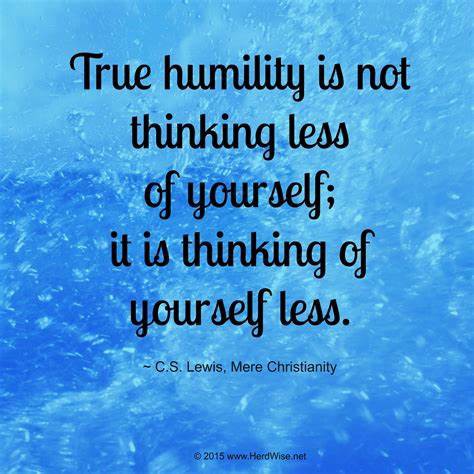?Humility is the base and foundation of all virtues, and without it, no other virtue can exist.? ? Cervantes

We are hypocritical about the kind of leaders we need and the kind we have traditionally chosen and supported. Specifically, we have tended to choose the extroverts, the flamboyant narcissists, the psychopaths, the incompetents, and mostly men, far more often than we have chosen the quiet introverts, those with enhanced emotional intelligence, the effective, and humble. Yet, research shows that humble leaders are more effective and enjoy more positive relationships with others.
What is humility?
The term ?humility? comes from the Latin word humilitas, a noun related to the adjective humilis, which may be translated as ?humble?, but also as ?grounded?, or ?from the earth?, since it derives from humus (earth).
Humility gained a place of importance in various religions. The Bible (Philippians 2: 3?11) says ?Do nothing from rivalry or conceit, but in humility count others more significant than yourselves.? St. Augustine argued ?It was pride that changed angels into devils; it is humility that makes men as angels.?
In the Jewish tradition, humility is among the greatest of the virtues, as its opposite, pride, is among the worst of the vices. Moses, the greatest of men, is described as the most humble. In the Islamic religion being humble, means that one is modest, submissive and respectful, not proud and arrogant. You lower yourself to the ground, not elevate yourself above others.
In prayer, Muslims prostrate themselves to the ground, acknowledging human beings? lowliness and humility before God. Like other spiritual traditions, Buddhism sees humility as a virtue. From a Buddhist perspective, humility is a result of enlightenment and nirvana. In the Buddhist text on Maha-karuna (great compassion), humility is one of the ten sacred qualities attributed to Avalokite Bodhisattva, or Buddha of Compassion. Buddhism also advocates humility as a moral precept. Confucius said ?Humility is the solid foundation of all virtues.? Lao Tzu said ?I have three precious things which I hold fast and prize. The first is gentleness; the second frugality; the third is humility, which keeps me from putting myself before others. Be gentle and you can be bold; be frugal and you can be liberal; avoid putting yourself before others and you can become a leader among men.?
Hindus view humility as a spiritual and humanistic virtue. Ancient Hindu artists were never supposed to sign their names on their work, and temple artists, when creating statues of gods, are always supposed to leave a deliberate imperfection to show that they cannot really represent God.
Philosophers and spiritual sages have also identified humility as a ?meta-virtue? that is foundational to other virtues such as forgiveness, courage, wisdom, and compassion. Humility may be foundational to other positive characteristics because, as a ?temperance virtue? that guards against excess it may temper other virtues, keeping them within the Aristotelian ?golden mean? or the Buddhist ?middle way?), and Confucian zhongyong(?doctrine of the mean). Humility prevents other characteristics from becoming extreme.

Non-Religious Perspectives on Humility Through the Ages
Outside of a religious context, humility is defined as being ?unselved?, a liberation from consciousness of self a form of temperance that is neither having pride (or haughtiness) nor indulging in self-deprecation.Humility, in various interpretations is widely seen as a virtue which centers on low self-preoccupation, or unwillingness to put oneself forward, so it is in many religious and philosophical traditions, it contrasts with narcissism, hubris and other forms of pride and is an idealistic and rare intrinsic construct that has an extrinsic side.
Socrates said of humility: ?Pride divides men, humility joins them.? In describing the nature of virtuous self-knowledge as an appropriate attribute, Aristotle defined pride as respecting oneself. As with other virtues, Aristotle defined pride as the mean between a personal hubris and an insufficiency or a lack of self-esteem. In the Nichomachean Ethics, Aristotle explained that a person is proud if he both is and thinks of himself to be worthy of great things.
Both British philosopher David Hume and German philosopher Friedrich Nietzsche were critics of the trait of humility. Hume said, ?humility serves no manner of purpose; neither advance a man?s fortune in the world, nor render him a more valuable member of society.? German philosopher Frederick Nietzsche viewed humility as a strategy used by the weak to avoid being destroyed by the strong.
Mahatma Gandhi is attributed as suggesting that attempting to sustain truth without humility is doomed to become an ?arrogant caricature? of truth. Albert Einstein said of humility, ?I prefer an attitude of humility corresponding to the weakness of our intellectual understanding of nature and of our own being.? And finally the esteemed writer C.S. Lewis said, ?Humility is not thinking less of yourself, it?s thinking of yourself less.?
Unfortunately, our history has not been kind to the trait of humility. Dictionaries often describe humility as low self-esteem, self-degradation and meekness. In a 2016 College of Charleston survey, 56% of 5th and 6th graders said that the humble are embarrassed, sad, lonely or shy. When adults are asked to recount an experience of humility, they often tell a story about a time when they were publicly humiliated.
Characteristic Traits and Behaviors of Humble People
Researcher J.P. Tangney specified these features of humility: an accurate assessment of oneself; acknowledgement of one?s limitations and mistakes; an openness to other perceptions and ideas; viewing one?s accomplishments and abilities in perspective; lower self-focus; and appreciating other people and things. Similarly, psychologist E. L. Worthington suggested that humility is reflected by traits such as being other-oriented, prosocial, altruistic, modest, willing to accept both strengths and weaknesses, and the absence of thoughts or behaviors that reflect being prideful, arrogant, or entitled. Humility tends to be associated with modesty; highly humble people do not appear to be as motivated to convey enhanced images of themselves to other people as less humble people.
Research on humility has shown that it is one of the core organizational virtues proposed to provide the foundation for moral action in the workplace and to foster positive behavior, exceptional performance, and altruism. In the context of organizations, virtues such as humility have been generally viewed as that which is good, human, and produces social betterment.
What Inhibits Humility?
In my article in The Financial Post, ?Why Do We Still Idolize the Narcissist Boss, Even Though We Know the Humble Ones Produce Better Results?? I cite a research study completed by Charles A. O?Reilly III at Stanford?s business school. O?Reilly and his colleagues surveyed employees in 32 large, publicly traded tech companies. He contends that bosses who exhibit narcissistic traits like dominance, self-confidence, a sense of entitlement, grandiosity and low empathy, tend to make more money than their less self-centered counterparts, even if the lower-paid CEOs exhibit plenty of confidence. O?Reilly says of the narcissists, ?they don?t really care what other people think and depending on the nature of the narcissist, they are impulsive and manipulative.?
O?Reilly goes on to argue the longer narcissistic leaders are at the helm, the higher their compensation in comparison with the rest of the leadership team, or in some cases the narcissistic bosses fire anyone who dares to question or challenge them. There is a dark downside to this appearance of success however, O?Reilly contends. Company morale often declines, and employees leave the company. And while the narcissistic or abusive leaders may bring in the bigger paychecks, O?Reilly says there is compelling evidence that they don?t perform any better than lower-paid, less narcissistic counterparts. This argument has been supported by Michael Maccoby in his book, The Productive Narcissist: The Promise and Peril of Visionary Leadership.

Study after study shows that the failure rate for CEOs and senior executives is very high; many executives exhibit more overconfidence than competence; and the main reasons why they fail are due to hubris, and a lack of emotional intelligence. Calls for leader humility have intensified in the wake of corporate and political scandals attributed to the unbridled ego, sense of entitlement and self-importance of the leaders involved. Multiple researchers have identified leader arrogance and narcissism as the reasons why leaders make bad decisions.
Mark R. Leary and Chloe C. Banker, argue in their book, A Critical Examination and Reconceptualization of Humility,?In contexts that operate as meritocracies, people who are good at something or who possess exceptional characteristics are entitled to preferential treatment within the domain of their expertise and accomplishments. The best athletes should get more playing time, the best employees should receive larger salaries, the best actors should win more awards, and so on. In general, norms often specify that people who accomplish and contribute the most may deserve additional recognition, respect, or deference in contexts in which their accomplishments and positive characteristics are relevant. Believing that one deserves to be treated as different or special in such contexts is normal and appropriate. ?
Jennifer Cole Wright in her edited book, Humility, says, ?The central problem with low humility is not that people think that they are better than others. People low in humility expect others to treat them as special; try to reap social benefits that they don?t deserve; and their sense of entitlement leads them to behave in self-centered ways that disadvantage other people.?
In contrast, humble people who do not put themselves above others, or expect preferential treatment, or think they are entitled to a disproportionate share of any benefits, and are more likely to treat others in an egalitarian, respectful, and fair manner, Wright argues.
All theorists agree that humility is associated with an array of prosocial behaviors, and studies support this link. For example, humility is associated with gratitude, willingness to help others empathy forgiveness and success in working and communicating with others In close relationships, humble people display greater skill at conflict resolution and are more likely to make sacrifices for others and they display more trust, greater cooperation, and less conflict.
Are Certain Personality Types Predisposed to be Humbler?
Are people naturally predisposed to be or are they predisposed to be non-humble. Humility would not have become possible until our pre-human ancestors acquired a sophisticated ability for symbolic self-relevant thought that allowed them to consider whether they should be treated special because of their attributes or accomplishments. Scientists do not know for certain when our capacity for self-reflection first arose, as no evidence of it appears in the archeological record until less than 100,000 years ago, so humility as a component of self-reflection is a much more recent human attribute.
How Humility Reinforces Greater Self-Awareness
Humility entails an unvarnished and honest assessment of who you are. Humility is necessary to fully eliminate our self-oriented tendency to view others as inferior, or not worthy of our compassion or kindness. In this way, humility quiets the incessant push and pull of our desires, wishes, and fears, deepens our capacity for patience, moderation, and modesty.
Others writers have defined humility in terms of more of a focus on others than ourselves, encouraging the development of our empathy, gentleness, respect, and an appreciation for the equality, autonomy, and value of others, as well as a concern for their welfare and a willingness to share credit for accomplishments with others. Humility can be seen as a virtue and opposite to a number negative personality traits, including arrogance, vanity, conceit, egotism, grandiosity, pretentiousness, snobbishness, impertinence, haughtiness, self-righteousness, domination, selfish ambition, and self-complacency.
How and when is humility cultivated? Some writers would argue through early life experiences ? experiencing ?limbic resonance,? and developing a healthy sense of both autonomy belonging through secure attachment, with caregivers and community members. When raised in a community and culture that fosters the formation of early emotional connectedness with and deep concern for others, humility will likely also begin to develop early, since the self-oriented biases that emerge as a function of our natural centeredness are being quieted through these social practices and are therefore not given the opportunity to manifest into self-absorption or self-worship.
Deep caregiving and nurturing for others through assisting communities with people of disabilities, for example, can develop one?s humility. These circumstances require us to submit to that which is beyond our capacity to change, repair, or solve; or even fully understand. In response to this, we must give ourselves up to simply loving what is in front of us, without needing to change or ?fix? it; to a ?selfless respect for reality.?
The Benefits of Humility
Peter Hill, writing in Global Plus, Researchers identified a number of benefits for individuals embracing humility:
? Greater virtue: Humility correlates positively with a number of virtues or virtue-related behaviors such as forgiveness, honesty, generosity, gratitude, and cooperativeness.
? More joy, less anxiety: Humble individuals experience fewer negative psychological symptoms and report better health. One study of older adults found those who were more humble rated their health more favorably over time.
? Better relationships: Humble people are perceived as being kinder and more likeable than are less humble people. In studies, humble individuals were found to be better able to receive love from others, and people with humble partners were more likely to be committed to the relationship and more likely to offer forgiveness for perceived offenses.
? Higher self-worth: Humble people, unlike individuals constantly seeking attention or validation from others, possess a secure sense of self-worth. It is what frees humble people from the need to impress or dominate others, and allows them to value new ideas and respect the achievements of others as well as their own.
? More effective leaders: Forget the idea of humble people as weak leaders. Just the opposite, research shows. For example, while arrogance and unbridled egos have been at the center of corporate scandals, business leaders who are able to listen, be transparent about their limitations and appreciate the strengths and contributions of others are better able to navigate changing marketplaces and retain and engage talented employees.
- Less prejudice, greater tolerance: Humble individuals are more likely to appreciate and be receptive to unfamiliar beliefs, values, and worldviews, and to be empathetic and compassionate to those in need.
The Research on Humble Leaders
As organizational environments have become more dynamic, uncertain and unpredictable, it becomes increasingly difficult for any one leader to ?figure it all out of the top,? says management guru Peter Senge. As a result, an emphasis has shifted to leaders engaging in more ?bottom-up,? humble approaches to leadership.
Although a great deal of disagreement about the precise leader behaviors that are associated with humility exists, there is some consensus that humility generally involves how leaders tend to view themselves more objectively, others more appreciatively, and new information or ideas more openly.
Humility is mainly an innate virtue, or stable personality trait, rather than a set of behaviors that leaders can enact. For instance, some writers have suggested that leader humility involves self-awareness, openness to new ideas, and the tendency to look past or ?transcend? oneself. Similarly, others have argued that humility entails a willingness to understand the self (strengths and weaknesses) and an orientation toward others more than self.
In stark contrast with narcissism, which is often described as entailing volatile swings from grandiose to self-abasing self-views, humility has been labeled as a temperance virtue that has a stabilizing or grounding influence on self-perceptions. Thus, though humility and narcissism are likely to be negatively related, a humble leader is not merely the opposite of a narcissistic one. In addition, since the strong negative emotions of envy and jealousy often hinder the ability to make accurate self-appraisals, scholars have suggested that effective emotional management and awareness are associated with humility.
Researchers Yanhan Zhu and colleagues studied the relationship between humble leadership and employee resilience and productivity and concluded:
Humble leaderships can be defined as:a leadership style in which a leader evaluates him/herself and subordinates through a multifaceted and objective lens, appreciating subordinates? positive worth, strengths, and contributions. It contains three behavioral components: (a) a willingness to acknowledge one?s limits and mistakes; (b) shining a spotlight on employees? contributions and strengths; and keeping openness to advice, ideas, and feedback.
Humble leadership is perceived by employees as a way to facilitate personal and professional growth.
Edgar H. Schein and Peter A. Schein in their research and published study, Humble Leadership: The Power of Relationships, Openness and Trust, argue that the growing complexity of the modern world requires stronger workplace relationships in order to accomplish tasks. They argue the pace of change in the world is increasing in just about every context. Schein and Schein cite examples where humble leadership has been developed: The country of Singapore and the U.S. Military.
The authors argue that the changing world necessitates humble leadership due to the changing nature of work:
Leadership will become more and more about context and process rather than content and expertise.
Humble Leadership can help overcome unconscious biases, segregation, and exclusion.
Individual abuse of power is tempting. Humble leaders have a better track record of resisting the abuse of power in comparison with leaders with low humility.
Humble leadership can help facilitate the movement toward agile organizations.
The authors make the salient point that the workplace now puts a premium on so-called ?soft-skills? and experimental learning, and is moving away from authoritarian and one-size fits all training and development. They say that it?s the leader?s responsibility to foster those dynamics correctly by introducing the right tasks at the right time and at the right pace. Your effectiveness as a humble leader will depend on how well you can incorporate soft skills into the group dynamic so your group can accomplish even its most complex goals.
Humble leaders are more effective and better liked, according to a study published in the Academy of Management Journal. ?Leaders of all ranks view admitting mistakes, spotlighting follower strengths and modelling ?teachability? as being at the core of humble leadership? says Bradley Owens, assistant professor of organization and human resources at the University at Buffalo School of Management. A follow-up study published in the journal Organization Science,using data from more than 700 employees and 218 leaders, confirmed that leader humility is associated with more learning-oriented teams, more engaged employees and lower voluntary employee turnover.
The more honesty and humility an employee may have, the higher their job performance, as rated by the employees? supervisor according to a Baylor University study published in the journal Personality and Individual Differencesby Wade Rowatt, associate professor of psychology and neuroscience. He found humility was a unique predictor of job performance.
Amy Y. Ou and her colleagues at Arizona State University published a study in Administrative Science Quarterly, examined the leadership traits associated with Confucianism. Those traits include self-awareness, openness to feedback, and a focus on the greater good and others? welfare, as opposed to dwelling on oneself. Ou and her colleagues arguethe self-awareness of humble leaders enables them to be open-minded and willing to learn, to appreciate both their own strengths and weaknesses as well as those of others, and to transcend the self in the pursuit of a higher and more significant objective while continuing to improve. They concluded Accordingly, humility provides integration of both high self-knowledge and low self-focus in terms of identifying personal priorities about goal achievement. They contend humble leaders
? life pursuits are less about themselves than about the larger community, the greater whole, moral principles, or ultimate universal truth.?
In an article in theHarvard Business Review entitled ?Level 5 Leadership: The Triumph of Humility and Fierce Resolve,? leadership expert Jim Collins argues the best leaders exhibit humility, compelling modesty, shunning public adulation and are never boastful. In a widely read Harvard Business Reviewpublication, Collins explained that the personal humility of Level 5 Leaders was typified by: A compelling modesty about their accomplishments; quiet determination rather than charisma; ambition focused on the company rather than self; willingness to accept personal responsibility for failures; and acknowledgment of the role of others in achieving success.
Joseph Folkman a new report, ?How Do You Become an Effective Leader? Stay Humble,? a follow up to a previous article on humble leaders In Harvard Business Review, argues?How do people make the judgment that a leader is arrogant or humble? Arrogant leaders don?t parade around with a badge indicating they are conceited. Yet, there is a high degree of consensus within organizations about who is humble and who is arrogant. The reality is that there are a set of very predictable behaviors that send clear signals about an individual?s humility or arrogance.? Folkman studied 1,072 leaders and concluded the following:
Humble leaders are rated higher than arrogant leaders on an overall leadership effectiveness index. A comparison of arrogant and humble leaders on an overall leadership effectiveness index composed of 54 behaviors that differentiate the most effective from the least effective leaders. Arrogant leaders were rated at the 34th percentile, while humble leaders were rated at the 66th percentile.
Humble leaders demonstrated that people are just as important as results. The arrogant leader believes that results are the ultimate goal, and if a few people get negatively affected, that?s just the cost of doing business. The humble leaders understand the balance of achieving while still being sensitive to individual needs. They also believe if you take care of people, they will be more engaged and dedicated, which will produce better results in the long run.
Humble leadersfocused on gaining trust from others.Humble leaders do everything they can to build up trust with others. They are more effective on the key levers that build trust, which are: creating positive relationships, consistently delivering on their promises, and providing expertise and good judgment.
Humble leaders believe that success comes from cooperation and collaboration.The arrogant leader believes that they can accomplish goals on their own. They resist collaboration because they want all the credit for themselves. The humble leaders know that organizational success comes from people working together. They ask others for help and resist taking credit for the accomplishments of others.
Humble leaders are role models and walk their talk.When humble leaders ask others to do something, they make sure they do it first. Arrogant leaders are okay with asking others to do what they do not do. They are fine with having a double standard, or perhaps they don?t see it. In many ways, they act as though they are a privileged class where rules for others do not apply to them.
Humble leaders ask for and acts on feedback from others.Humble leaders ask others for feedback and work hard to implement their suggestions for change. Arrogant leaders feel that they do not want or need feedback from others. In fact, they often feel that asking for feedback would signal a lack of confidence in themselves. Therefore, they resist asking.
Humble leaders resolve conflicts productively. Arrogant leaders tend to create conflict with others. This is due, in part, to a belief that conflict is a good thing that fuels competitive energy from others. Humble leaders feel that conflict creates a negative work environment and work hard to resolve conflicts.
Humble leaders give others honest feedback.The arrogant leaders believe their job is to be the judge and let others know when they make mistakes. Their feedback is almost always negative and corrective. The humble leader realizes that honest feedback needs to reflect an individual?s performance.
Folkman says these behaviors listed above represent the largest differences between arrogant and humble leaders. ?Looking over the list,? Folkman says, ?it isn?t difficult to realize why humble leaders win. In many ways, humble leaders believe that leadership is the ability to get work done through others. In contrast, arrogant leaders believe leadership is the ability to get work done by others.?
Humility and Our Concept of Leadership
Increasingly, scholars and practitioners have argued the need for today?s leaders to approach their roles with more humility. As result of workplace complexity and fast changes requiring leader flexibility, recent leadership theories have begun to place greater emphasis on the bottom-up aspects of leadership. Some experts even argue for a need to change ?the very idea of leadership ? what it is and how it works and even how people even know it when they see it.?
Researchers have also suggested that leaders should move beyond the hero myth or ?great man? theory of leadership by having leaders show their humanness by being open about their limitations in knowledge and experience, and focusing more on how followers influence the process of leadership.
More recently many scholars and experts have called for professionals and leaders in all professions to approach their roles with more humility. For example, for lawyers and judges, humility is important to effectively interpret the law and balance the ideals of justice and mercy. In medicine, competence and humility are seen as the two essential dimensions of medical professionalism. Humility has also been spot-lighted as important for political and military leaders, particularly in the current political climate.
Bottom-up, participative leadership lends itself to the inclusion of humble leadership. Although some advocate top-down strategic change approaches others are now arguing the need for organizations to learn to ?grow strategy from below,? seek bottom-up ?small wins,? as reflected in the agile leadership model. Advocates of emergent change argue the importance of organizations being willing to live on the ?edge of chaos? to achieve the level of flexibility and adaptability required for continuous transformation.
There are several similarities between humble leadership theory and servant leader theory, a general focus on development being the most obvious. Servant leaders view ?view the development of followers as an end, in and of itself, not merely a means to reach the leader?s or the organization?s goals.?
Leaders who humbly acknowledge they do not need to be the master of all skills and communicating to others they have much to contribute in achieving an optimal result also builds organizational commitment and increases trust in the leader argue researchers Robert S. Dennis and Mihal Bocarnea. Not only does accurate self-knowledge recognize one?s own values, they argue, but humble leaders fully recognize the importance of others? values and priorities ? including the big picture capacity to pursue a better future that can come from collaborative action, and the necessity of creating strong partnerships with others to achieve that optimal future.
Summary:
Both the research and my three decades of coaching and mentoring leaders has led me to conclude the following about why humble leadership is desirable:
Humble Leaders Are More Effective.
Employees working for humble leaders are more engaged, satisfied and productive and better organizational citizens. Humble leaders give credit to their team members and let everyone share in the team?s success. Humble leaders build trust. Humble leaders recognize their own shortcomings and are willing to ask for help when a problem is outside of their area of expertise. Humble leaders are coachable. They listen to feedback from others and use it to improve their own performance.
Humble Leaders Are Overlooked.
Unfortunately, modern organizations often overlook humble leaders. Charisma, charm and self-proclamations of competence are still seen as desirable leadership traits, and predominate recruitment strategies, despite their lack of associationwith leadership effectiveness.
A Lack of Humility Ruins Organizations.
Most businesses ultimately fail due to poor leadership. There are several persistent themes that can account for leadership failure and all are related to a lack of humility. The first theme of poor management is an exaggerated sense of self and entitlement, often exhibited by narcissistic leaders. Such narcissists obviously lack humility but are quite adept at getting themselves into leadership positions. Ultimately, these leaders alienate their employees because they make promises that they cannot keep, they take credit for all successes, and they blame anyone and everyone else for any failures. The second theme of poor management is a lack of awareness about how one?s actions are affecting others. These leaders are insensitive to the ?people side? of doing business. Further, they fail to recognize this insensitivity as a shortcoming. While humble leaders are open to listening to what other people feel and think, insensitive leaders are unwilling to listen to opinions and feedback from others.
The third theme of poor management is an exaggerated need for social support and approval. Narcissistic leaders and those with low humility are in constant need of positive reinforcement, praise and personal loyalty. Similarly, the fourth theme of poor management is insecurity and low self-confidence. Both of these traits are rooted in insecurity and fear of rejection. Leaders who lack humility are desperate for attention and approval of others. Indeed, much of their expressed arrogance and overconfidence is intended to mask a deep desire for the approval of others. Leaders who are appropriately humble are seen as confident and suffer from neither diffidence nor arrogance.
Leaders are the most consequential members of any organization. Unfortunately, the current cultural attraction to leaders who are charming, charismatic and self-promoting (e.g., transformational leadership) is leading us in the wrong direction. Some of our most effective leaders are hiding in our organizations, masked by their own humility. For the future success of our organizations, finding them is critical.
Humility can be a powerful force in enhancing and developing leader self-awareness. They go hand in glove.
Read my latest book: Eye of the Storm: How Mindful Leaders Can Transform Chaotic Workplaces, available in paperback and Kindle on Amazon and Barnes & Noble in the U.S., Canada, Europe and Australia and Asia.



